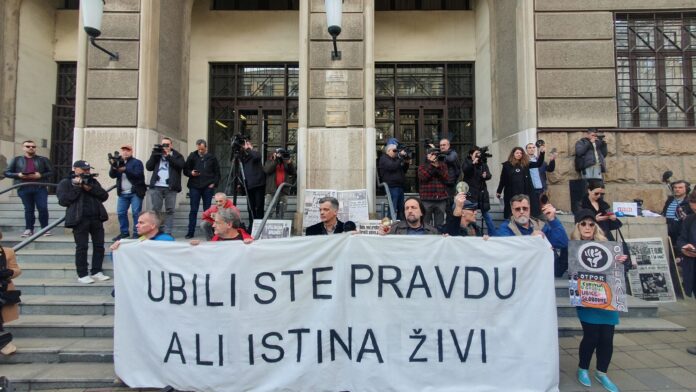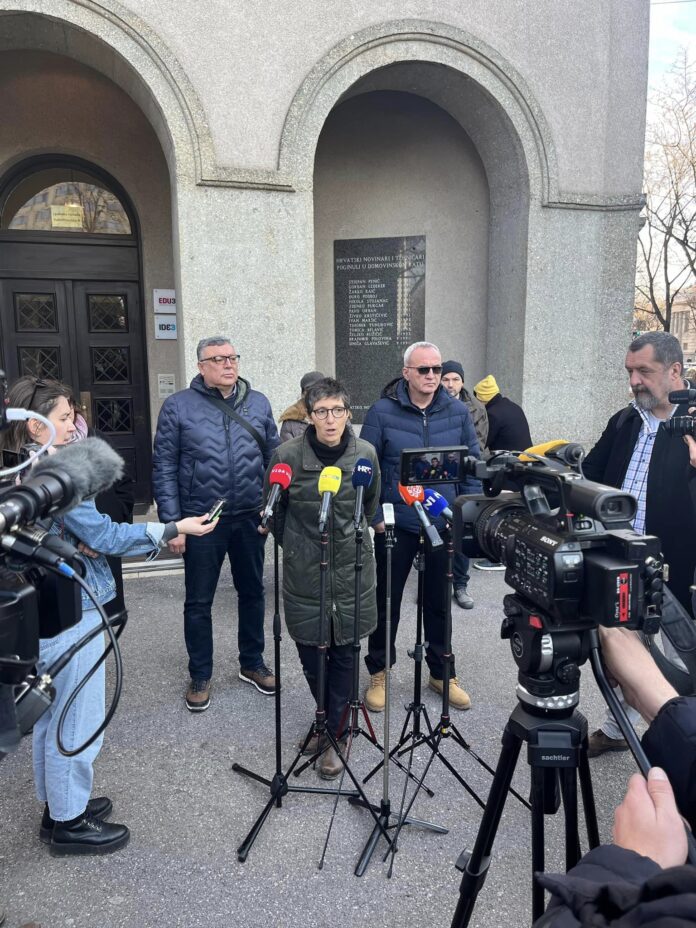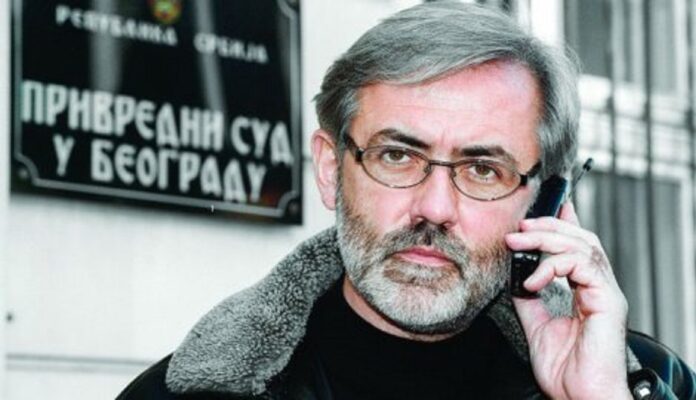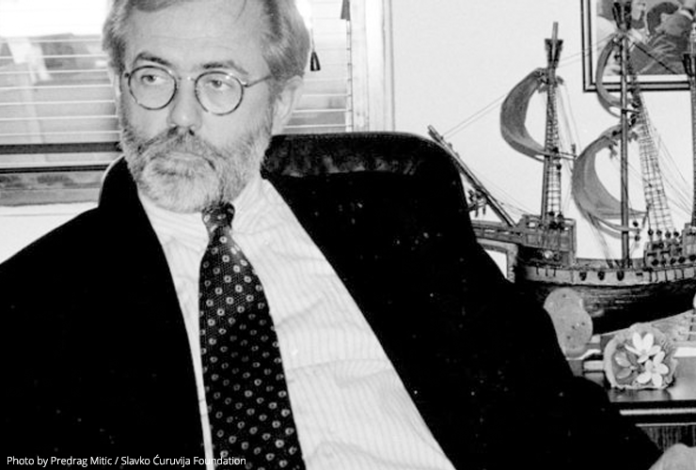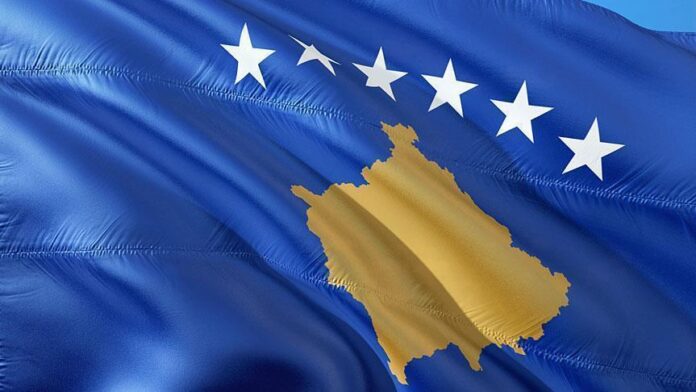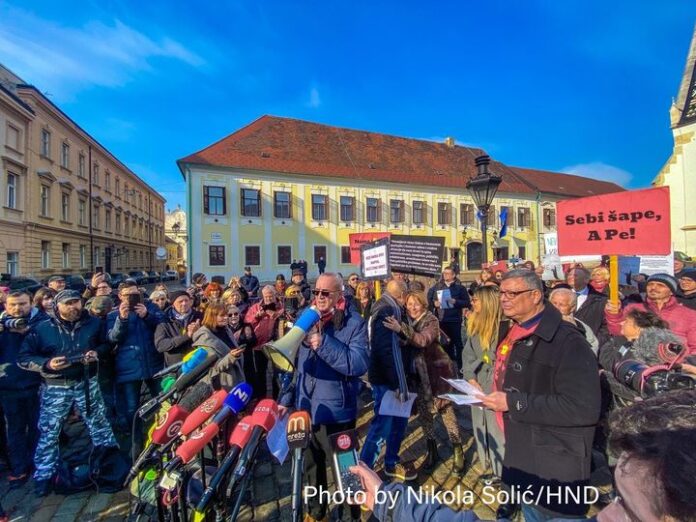The intention of Lex AP has been clear from the very beginning. The law widely opens the door to concealing abuses of the repressive apparatus and abolishes transparency as a mechanism for controlling the work of the police, the State Attorney’s Office, and the courts. Anyone within the investigative system who comes across information about irregularities, which are of public interest, will think twice before sharing them with the media. The state has intimidated them; three years in prison is no joke. Therefore, we demand that the Government withdraws this law of dangerous intentions, as conveyed from the CJA protests at St. Mark’s Square against Lex AP, with the same messages sent from the protest held by the CJA branch in the Split-Dalmatia County in Split in front of the Croatian National Theatre.
Numerous protesters, estimated to be over 500 in Zagreb and around 200 in Split, booed and chanted against AP, also sending messages through banners: “Plenki is a little nervous,” “No source, no political problem,” and “Self claws A Pe!”…
CJA President Hrvoje Zovko presented the protesters’ demand: for the Government to withdraw the law of dangerous intentions and abandon further restrictions on media freedoms, including Article 307.a of the Penal Code, which deals with “unauthorized disclosure of content from investigative or evidentiary actions.”
As one respected colleague stated, “This protest also showed that the journalistic profession is united in the fight for professional rights and the public’s right to information of public interest. It was clearly and loudly said no to the attack of politics on public interest and media freedom.”
“We are proud that CJA has two protests against laws which Andrej Plenković wants to silence critical voices in this super-election year. From Zagreb, we send a warm greeting to our dear colleagues in Split and to everyone who came to support them! Let me be clear. The Croatian Journalists’ Association demands that LEX AP, the law of dangerous intentions, or Article 307.a, be completely rejected! We will not give up on this! Believe me, Mr. Prime Minister, it will be no effort for us to come here again if you do not do it,” emphasized CJA President Zovko, who added that yesterday’s parade with amendments at the last minute was nothing more than a cheap political trick with which Andrej Plenković and the Government of the Republic of Croatia tried to deflect justified criticisms of journalists and all those who care about living in an honest and just society.
“You backed down under pressure from CJA, but your withdrawal has a big and dangerous trap. Regardless of your cosmetic interventions, our colleagues can still be harassed. We are horrified by the fact that, Mr. Prime Minister, you have never refuted us that journalists will not have their phones and laptops confiscated together with all the content in them. Until the determination of what is in the public interest in legal proceedings, our colleagues and whistleblowers will face months of harassment and intimidation,” said Zovko, adding: “Likewise, the State Attorney’s Office can assess whether some information has been released in the public interest. If it fails to do so or does so unprofessionally, no one will prevent it from starting an investigation. If the State Attorney’s Office decides to initiate a procedure, they will call journalists for interviews, try in every way to discover the source that provided them with information, and no one can prevent them from doing so.”
Zovko said that CJA officially sent a letter to the Ministry of Justice and Administration asking them to provide information on which European countries have a solution similar to Article 307.a proposed by the Government, but there was no response.
“Let’s not lie to ourselves; the whole story about the law of dangerous intentions is aimed at silencing the journalistic profession and all brave individuals in the system who want to speak out about numerous illegal actions. We’re sorry, Mr. Prime Minister, but we don’t want to participate in building your cult of personality,” said Zovko, followed by applause, after which there were whistles against AP.
“If whistleblowers are silenced, citizens will never learn about certain criminal acts! Let’s remember the traffic accident of Vukovar-Srijem County Prefect Damir Dekanić a few years ago, where he drunkenly crashed an official car and falsely claimed that it was being driven by his cousin. If information from the investigation couldn’t have been published at that time, it’s questionable whether he would have been arrested with three policemen suspected of helping him fabricate the accident. If nothing could have been disclosed, the public might not have learned that a police officer shot Mihaela Berak and that it wasn’t an unfortunate accident, as the police claim, but an intentional murder from an official firearm, as the State Attorney’s Office believes. Mr. Prime Minister, from this place, I will tell you: people, not legal wording, are the key to the whole story,” emphasized Zovko, adding that the crucial thing is not to introduce this new provision into that legal provision, but the choice of the person who will implement it in practice without any effective oversight.
“And you have already decided who that will be. Well, we don’t agree with that! And finally, Mr. Prime Minister of the Republic of Croatia – by hiding in the Parliament behind femicides, behind the victims of heinous crimes, you are trying to protect numerous sheriffs, there are quite a few of them, especially from your party. You are now putting all members of parliament in a position where they must support your infamous law if they want to support the inclusion of femicide as a criminal offense. Otherwise, if they vote against LEX AP, they are also against provisions on femicide. How low and insensitive… It’s hard to go lower than this. History will remember you for this, Mr. AP! It is always important to repeat, not to forget: Andrej Plenković is the Prime Minister with the most journalist protests in his mandate. Andrej Plenković is the Prime Minister who didn’t mind leaks of information and democracy until his initials appeared in the public. He wants to edit news through the courts,” concluded Zovko.
President of the European Federation of Journalists Maja Sever especially praised the engagement of the entire CJA in organizing the protest itself and the fight against LEX AP. She added that neither she nor everyone present found it burdensome, and the retreat of AP and its lackeys did not discourage journalists and citizens from gathering and protesting against the law of dangerous intentions.
We are particularly bothered by the arrogance and cynicism with which the AP addresses the profession and all citizens, and that is unacceptable and will not pass, and if necessary, we will come again,” Sever said and quoted a famous movie quote: “Don’t pee on my back and tell me it’s raining.”
Vice President of the CJA, Drago Hedl, reminded in his speech of the practice where the ruling party always includes something less important in the working version of a law proposed for the Parliament, which can easily be removed in the final version under pressure from the opposition and the public, but the essence will be preserved.
The same is happening now with the Lex AP. First, they abandoned the punishment of journalists who publish information obtained from investigations, and yesterday the Minister of Justice announced that there will be no criminal offense if information is leaked in the interest of the victim, in the interest of defense in criminal proceedings, or in the overriding public interest. This apparent softening of the initial formulation of the criminal offense actually changes nothing – the essence remains: preventing and punishing the publication of such information. We are not here today out of fear of going to jail for publishing information from an investigative procedure; we are here in the interest of the profession, journalism as a public good, which works for the public good,” Hedl emphasized, adding that there are two cunning traps in the alleged retreat of the legislator, which relate to the non-punishment of journalists even if the publication of information from the investigation is in the overriding public interest.
First, how will the law define the term ”journalist,” who is and who is not, because from the previous judicial practice we see that some judges consider only people with a journalism degree or those who are employed in a media organization as journalists. Second, who guarantees that a journalist will not be punished for publishing information from the investigation under another legal basis, as an accomplice in committing a criminal offense,” said Hedl, commenting on the announcement of Minister Malenica that there will be no criminal offense if information from the investigation is published in the overriding public interest, he said: “The question is who and how evaluates what is and what is not in the public interest. In several judicial proceedings, judges have judged that there is no public interest in the publication of some information. Why wouldn’t investigative authorities act the same way? Why do they know better than journalists what is and what is not in the public interest?”
We are not here today to seek exemption from prosecution for journalists because we believe that the law should apply equally to everyone. We are here because we firmly demand that the Lex AP be immediately and permanently removed from the agenda, that it be abandoned, because its introduction into the Penal Code means the end of investigative journalism, which often relies on sources, honest people in the system who disagree with the cover-up of details from investigations, which often benefits high officials or high-ranking people from the top of the party. That is why we are firmly against the Lex AP, we demand that it be completely and permanently abandoned, and I personally am more inclined to the name “Lex Apocalypse” because its adoption would be a real apocalypse for free journalism. But I am in favor of writing the first two letters of the word “apocalypse” in capital letters – letters AP, like the initials of its real author – AP,” concluded Hedl.
Vice President of the CJA, Chiara Bilić, reminded of the AP’s statement that they will change the Criminal Procedure Code and the Penal Code so that the things from the files come out uncontrollably, intentionally, politically, selectively, arranged and cause political problems.
AP is here accidentally, more sincerely than he wanted, revealed the essence of the reason for enacting the law: preventing political damage. Yesterday, Minister Malenica casually announced that he would add a paragraph to the legislative proposal relating to the overriding public interest, which will be decided by the court, a concession under pressure, and that’s it. Then we say that we will not back down from the concession. Thank you very much, we are not falling for those tricks. Because of the enactment of a law that is not in the public interest, the court will consequently determine whether something is in the public interest? What the government of Andrej Plenković is doing is beyond comprehension,” emphasized Bilić, stating that this is another blow to press freedom.
Whistleblowers are now being silenced – people who warn about diseases in a system or process. These people do not wake up in the morning thinking today I will call that journalist to give him details of the investigation because I am bored. Because even today, this tax represents a significant risk. Journalists are often the last instance; people turn to journalists when they see no other way out. This is a law of dangerous intentions. This is a law that protects AP and his cronies. And this is a law that uses dead female bodies for protection,” concluded Bilić.
A member of the Executive Committee of the CJA, Branko Mijić, emphasized that if this Lex AP passes in the Parliament, the public will not be allowed to know why the holder of a banner was forcefully arrested, what crime is attributed to him because of the word “Dad” and which investigative actions against the suspect were conducted, without journalists risking three years in prison.
By prosecuting all those who dare to make dark state secrets public or joke with the authorities, and little Croatia is boldly inscribed on the global map of spreading Gulags, from Guantanamo and Belmarsh to Quantico and Siberia. Therefore, this law is not only a law of dangerous intentions but also a law of dangerous purposes! The timing of its adoption coincides no coincidence with the election of the new Chief Public Prosecutor Ivan Turudić, which can mean only one thing: that both the Law and the Prosecutor will diligently protect the character and deeds of Andrej Plenković, as well as his courtiers, from any possible exposure in public,” said Mijić, adding that the purpose of this law is more dangerous than its intention for the media to become a blank slate when Žalac and Rimac correspond about the boss while investigators record them, or when his henchman Marko Milić uses political influence to employ the favored ones in Croatian forests.
But the ultimate purpose of this law is more dangerous than all these intentions, and it aims, no matter how much Plenković tries to keep us in the dark, to punish and isolate undesirable journalists in order to completely dominate the public space. Whoever possesses the narrative, possesses absolute power, because they present lies as truth and demonize the truth as a threat to democracy,” concluded Mijić.
The protest ended with Zovko’s message that the fight against LEX AP will continue until it is completely withdrawn because this is also our country, and the public interest is above all.
The protest was attended by the chief editors of the most important Croatian print media, Dragan Ogurlić from Jutarnji list and Dražen Klarić from Večernji list. Numerous opposition politicians were seen at the protest: Peđa Grbin, Sandra Benčić, Rada Borić, Davor Bernardić, Davor Hajdaš Dončić, Marija Selak Raspudić, and others.
Message from the Split protest: We will violate the law of dangerous intentions, because it is in the public interest.
In Split, at Gaje Bulat Square in front of the Croatian National Theater, more than 200 journalists and citizens gathered, stating that “we all know that the public interest is above anyone’s privacy.”
Damir Petranović, President of the Croatian Journalists’ Association (CJA) Split-Dalmatia County Branch, said that this is the worst and most dangerous law proposed in recent years.
Its intention is to limit freedom of the press and expression and deprive the public of the right to know and receive information of public interest, Petranović said, stating that journalists will not remain silent and sending a message to Prime Minister Plenković and the future Chief Public Prosecutor that journalists will violate this law for the sake of public interest.
Therefore, I call on whistleblowers and all citizens to violate this law because without the media and journalists, Croatia would descend into dictatorship, Petranović emphasized.
On behalf of journalists from the Šibenik-Knin County, Davorka Blažević addressed the journalists, thanking them for their great turnout and highlighting the fact that AP and its followers do not want to hear journalists and do not want journalists to write.
We didn’t believe that this worst law proposal would come about at all. And we shouldn’t harbor any illusions. This law aims to intimidate and is essentially directed not against those who would reveal information – police officers, judges, or someone from the system – but against journalists. They fear journalists and want to silence us, and we won’t allow that, Blažević emphasized.
Gabrijela Radanović, Vice President of the CJA Split-Dalmatia County Branch, addressed the esteemed AP, stating that “a healthy system is based on healthy foundations.”
The law of dangerous intentions – Lex AP – is based on ultimatums and a kind of blackmail of parliamentary deputies. By that, we don’t mean just the secured hands of HDZ members and partners, but others as well. By hiding behind femicide, behind victims of horrific crimes, you are trying to protect the sheriffs. And quite a few of them are from your party, esteemed AP. Parliamentary deputies can support the inclusion of a new criminal offense, the serious murder of a female person, only if they vote for the unauthorized disclosure of content and evidence as well. They are literally forced to support the infamous Plenković law, or else, they do not support the inclusion of femicide as a criminal offense. AP can hardly go lower than that, and we’ve seen it all, Radanović said.
At the protest in Split, Mayor of Split Ivica Puljak and his deputy Bojan Ivošević also expressed support for journalists. The protest ended with loud whistles directed at Prime Minister Andrej Plenković.
The negatives of the proposed amendments to the Criminal Code were systematically listed at the Split rally:
- The draft of the new law prevents people who see irregularities in the system from informing the public about it.
- The draft of the new law prevents journalists from sharing information about irregularities in the system with the public.
- The draft of the new law prevents people who have no protection from the powerful from informing the public about injustices happening to them in the system.
- The next time you or your child fail to get a job because it’s rigged and report it, if everything is covered up, no one will know because you won’t be allowed to say anything.
- The next time an attempt is made to cover up that a woman was hit by a partner who has friends in high positions, no one will know because no one will be allowed to say anything.
- The next time an attempt is made to cover up that some official caused a traffic accident, no one will know because no one will be allowed to say anything.
- The next time you send your child on a bus for a better life, it will be because corruption will eat up our country completely since no one will be allowed to say anything.
- Investigations are not secret, they are non-public. That’s why we can find out about irregularities and react. What will happen when we don’t know anything about irregularities?
- The visibility of irregularities enables us to change the country for the better.
- The visibility of irregularities protects the vulnerable and disenfranchised.
- The visibility of irregularities protects you.
- The visibility of irregularities protects our country.
- The interest of the largest possible number of our citizens, therefore the public, must come before covering up irregularities in the system.
- Andrej Plenković is the prime minister with the most journalist protests in his mandate.
- Andrej Plenković is the prime minister who had nothing against data leaks and democracy until the initials AP appeared in one file. Andrej Plenković wants to control the news through judicial means.
Compiled by: Ivica Buljan / CJA



